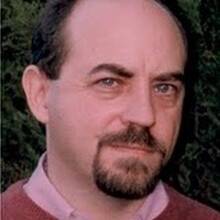Editor's note: On May 18, 2023, America published an essay celebrating the centennial of Teilhard de Chardin, S.J.’s Mass on the World and discussing the modern importance of Teilhard’s writings. Here, Prof. John P. Slattery responds to that article, followed by a response from the original author, Juan V. Fernández de la Gala.
Teilhard on race and eugenics
Given the research and subsequent discussions of Teilhard’s connection to eugenics over the past few years, I was hopeful that the essay America published on the centennial of Teilhard de Chardin, S.J.’s Mass on the World would have included, at the very least, a mention of these recent challenges in the spirit of transparency. However, the essay not only ignores this discussion but continues to pronounce as unblemished some of the specific doctrines that seem closely tied to Teilhard’s eugenic ideas of merging biological and spiritual perfection.
An example of this is the Omega Point, one of Teilhard’s seminal ideas that conceives of a future meeting point with God in a spiritual, cultural and biological evolutionary future. When Teilhard fully developed this idea in the 1930s and 1940s, he attached it to considerations of superior and inferior cultures (which he claimed his science supported), as well as superior and inferior peoples (which he claimed his eugenic philosophy supported). In The Phenomenon of Man, for example, Teilhard expands on the Omega Point while simultaneously calling for the pursuit of individual and cultural eugenic practices to refine and perfect human evolution.
There is considerable room for debate as to the extent to which Teilhard’s racial and eugenic ideas affected his positive theological contributions. However, it seems prudent that any significant promotion of his ideas—like a centennial celebration of his works—should at least mention the contemporary challenges of his views on race and eugenics, if for no other reason than to pay respect to the millions of people who suffered the consequences of racist science and eugenics.
John P. Slattery is the director of the Carl G. Grefenstette Center for Ethics in Science, Technology, and Law at Duquesne University.
It seems prudent that any significant promotion of Teilhard's ideas should at least mention the contemporary challenges of his views on race and eugenics.
Juan V. Fernández de la Gala responds to John Slattery
I am grateful to Professor Slattery for his comments. However, the theme of my essay was the Teilhardian prayer text Mass on the World. Thus, eugenics or supremacist visions remain completely outside the question. My response encompasses several levels of Teilhard’s context.
His biographical context put him far away from any supremacist or racist attitude. He served as a stretcher-bearer in the First World War in a battalion composed mostly of North Africans (Moroccan and Algerian soldiers), serving there with a bravery that was worthy of several military decorations. Further, his close coexistence with an international geological team in China and his warm and grateful prayer for all his fellows of such diverse origins, is manifestly expressed in his writings.
Teilhard also had a disabled sister, Marguerite-Marie, to whom he felt very close. He does not seem to consider her at all as a social burden, a human waste or a removable subject. “From her forced immobility,” Teilhard said about her, “she was able to turn into light the worst shadows in the World.”
The following quote from a letter to André Ravier, written from South Africa, will dispel any doubt about it:
Here as in Johannesburg there is only one thing or unpleasant impression: the government’s effort to desperately maintain white supremacy (schools for natives are re-formed under the principle of racial inequality, to be inculcated in children). The Anglicans reacted courageously. But the Catholic voice was never heard.
In a literary context, when Teilhard alludes to eugenics (in The Human Phenomenon and in Human Energy), his remarks do not have the syntactic form of an affirmation or a solid stand, but just a rhetorical question and an invitation to free reflection. The problem against which Teilhard always warns in these quotations is human overpopulation, which he thought would require the rational use of effective contraceptive methods.
I have not found evidence at all of any Teilhardian support of biological eugenics, supremacist ideas or racial discrimination.
Here too, I see Teilhard’s prophetic light shine in the need he expressed to separate sexual activity from reproductive activity. This issue remains a contentious one in our church, with many clamoring for a new theology of human sexuality.
The improvements of the species suggested by Teilhard have to do with the spiritual dimensions. He does not propose the supremacy of a biological or racially specific profile, but of implementing spiritual capacities—that is, freedom, conscience and responsibility in taking the reins of an evolutionary process that could bring us to God in the Omega Point.
In my opinion, Teilhard refers to this bloodless and respectful kind of “eugenics” as “kindly human” (“un eugénisme noblement humain”), and this is the kind of perfecting of the species he advocates. The births he proposed to improve are none other than those preached by Jesus of Nazareth clandestinely to Nicodemus: to bring a good birth to the spirit, to be born again (Jn 3:1-7).
I have not found evidence at all of any Teilhardian support of biological eugenics, supremacist ideas or racial discrimination. To the contrary, the evolutionary way to the Omega Point that he invites us is first a noospheric revolution that renews and reconstitutes evolution, endows it with a purpose and removes it from the brutal blindness of chance. Finally, it is a spiritual revolution along the lines of the happy utopia of the kingdom of God as preached by Jesus of Nazareth.
Juan V. Fernández de la Gala is the vice president of the Spanish Teilhard de Chardin Association.








